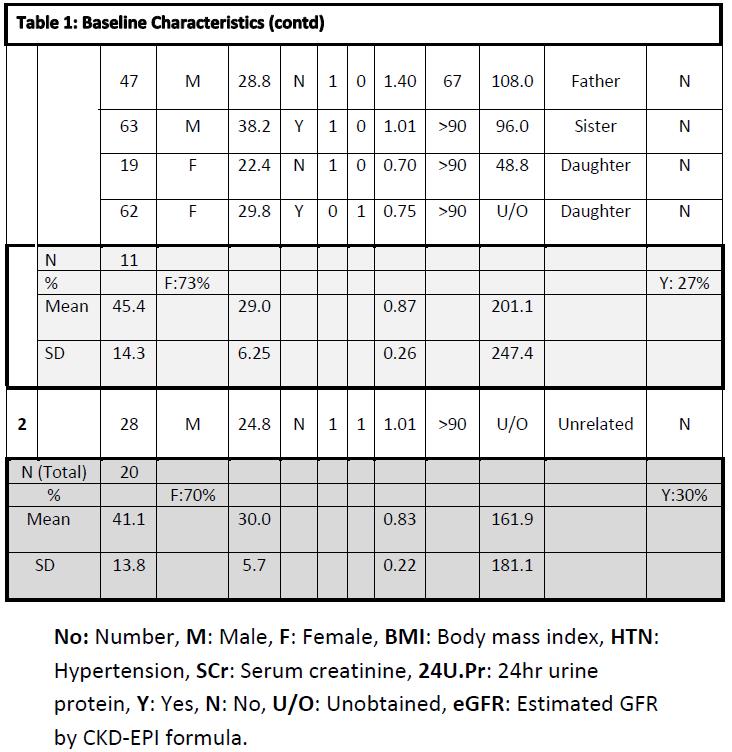Apolipoprotein L1 Genotyping in Potential African American Living Kidney Donors
U.Cincinnati, Cincinnati, OH
Meeting: 2019 American Transplant Congress
Abstract number: 129
Keywords: Donation, Genomics, Kidney transplantation, Outcome
Session Information
Session Name: Concurrent Session: Kidney Living Donor: Quality and Selection
Session Type: Concurrent Session
Date: Sunday, June 2, 2019
Session Time: 4:30pm-6:00pm
 Presentation Time: 5:30pm-5:42pm
Presentation Time: 5:30pm-5:42pm
Location: Ballroom A
*Purpose: African Americans(AA) account for 13% of the US population, yet compose more than one third of dialysis patients. Inheriting two Apolipoprotein L1 gene (APOL1) renal risk alleles(G1/G1,G1/G2 or G2/G2) is associated with an increased risk of nondiabetic kidney disease in patients with African ancestry. Compared to non-AAs where APOL1 renal risk variants are absent, about 13% of AAs carry the high-risk genotype(2 risk alleles) and 39% carry 1 risk allele. In this study, we investigate the utility of APOL1 genotyping in potential AA living kidney donors.
*Methods: Since May 2017, all potential AA living kidney donors evaluated at our center underwent APOL1 genotyping. Individuals with low-risk genotypes(0 or 1 risk allele) were eligible for further donor evaluation. Baseline characteristics and follow-up data were retrospectively analyzed using descriptive statistics.
*Results: Twenty potential donors were genotyped. One(5%) had 2 risk alleles and was therefore declined. Eleven(55%) and eight(40%) had 1 and 0 risk alleles respectively. Baseline characteristics are presented in Table1. Six individuals with low-risk genotypes donated a kidney and had acceptable kidney function, no proteinuria and normal blood pressure at up to 6 months of follow-up(Table2).
*Conclusions: In our cohort, the frequency of one risk allele was higher than that reported in the general AA population. We attribute this to our sample that is enriched with AAs wanting to donate to first degree relatives with advanced kidney disease. This further supports the utility of APOL1 genotyping in such individuals. Short-term outcomes for low-risk genotype donors were favorable which is consistent with the existing literature. We propose a role for systematically incorporating APOL1 genotyping in the evaluation and informed consent process of potential AA living donors particularly those of younger age.
To cite this abstract in AMA style:
Gudsoorkar P, Anand M, Kaur T, Shah S, Bumb S, Govil A, Jawdeh BGAbu. Apolipoprotein L1 Genotyping in Potential African American Living Kidney Donors [abstract]. Am J Transplant. 2019; 19 (suppl 3). https://atcmeetingabstracts.com/abstract/apolipoprotein-l1-genotyping-in-potential-african-american-living-kidney-donors/. Accessed February 27, 2026.« Back to 2019 American Transplant Congress



